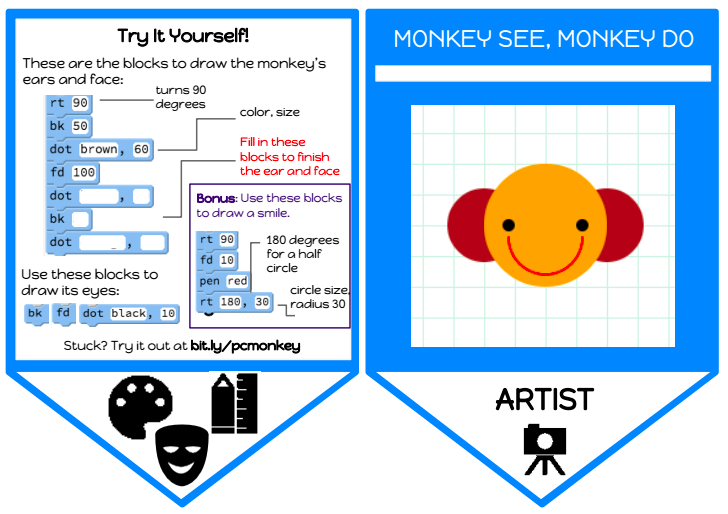Thanks to Our Harvard Students
We just wrapped up our Citizen Schools class, and I would like to especially thank our volunteers from the Harvard Graduate School of Education: Cindy Yang and Ji-Sun Ham, and thanks to Karen Brennan for connecting us with them.
This Spring Cindy and Ji-Sun volunteered with Pencil Code to develop a terrific 10-lesson seqence to use with Citizen Schools after-school classrooms. Citizen Schools runs extended-day programs in low-income schools, where all the students participate in special "after-school" classes hosted by volunteers in the community. The kids arrive in these after-school classes with a wide variety of interests, motivations, and skills, so to meet the challenge of helping volunteer teachers run a highly differentiated classroom, Cindy and Ji-Sun came up with the idea of Pencil Cards - bite-sized activities on a card.
Teachers bring a pack of Pencil Cards to each class, and students can pick a few to experiment with. The idea is that the range of choice helps students find project ideas that are both inspiring and at the right level for themselves. The cards are small enough that motivated students can do a few in a class. And there are a progression of cards going through a number of topics in computational thinking. The idea is inspired by Scratch Cards, a simple starter tool for Scratch.
Here is an example card from our first-day deck:

The great thing about the Pencil Card project is that Cindy and Ji-sun developed it while testing it in two classrooms, taught by volunteer teachers, with middle- school students at Dorchester's Dever-McCormack public school. One classroom was taught by a group of volunteers from John Hancock: Latisha Silvera, Ramakrishna Arugollu, and Kevin Egan, who had never used Pencil Code before. The other classroom was taught by Google volunteers Yana Malysheva and Ethan Apter. Informed by their experiences in the classroom, our volunteers contributed several of the ideas for the cards (inluding Yana's very popular monkey, above.)
There are 10 weekly classes in a Citizen Schools class, and in the last three classes, the students learned HTML, and used that knowledge to develop online portfolios of their work.
At the end of the class, the students presented their portfolios at a fair that Citizen Schools calls the "Wow" event, attended by parents and many other adults and professionals from the community. It was incredible to see the students presenting and explaining their own work at the event. Suddenly, they were the experts in the room, explaining their technology and showing off their creative ideas to all the visiting professionals. We were all impressed, and I think we have several future software entrepreneurs in the making.
I have helped to teach with Pencil Code in Citizen Schools classes for several semesters, but this term was unique because of the Pencil Card format. The format allowed every student to develop a deep portfolio of individual work (as opposed to working only one team project), so every student was fully engaged, and every student wrote a lot of code. At the end, every student, regardless of level, was able to present and explain their own inventions.
Next, Citizen Schools will package the curriculum in a form that they can use with classrooms nationwide. They have scheduled that work this summer, for use nationwide in the fall!
Bravo, and thanks to Cindy and Ji-Sun, Citizen Schools, and the 2015 teachers and students in the DMC Pencil Code classrooms.
A draft of the Pencil Cards can be found here. Cindy and Ji-Sun have been thinking of running a kickstarter to pay for a run of professional printing of the cards. Let us know if you might be interested!
